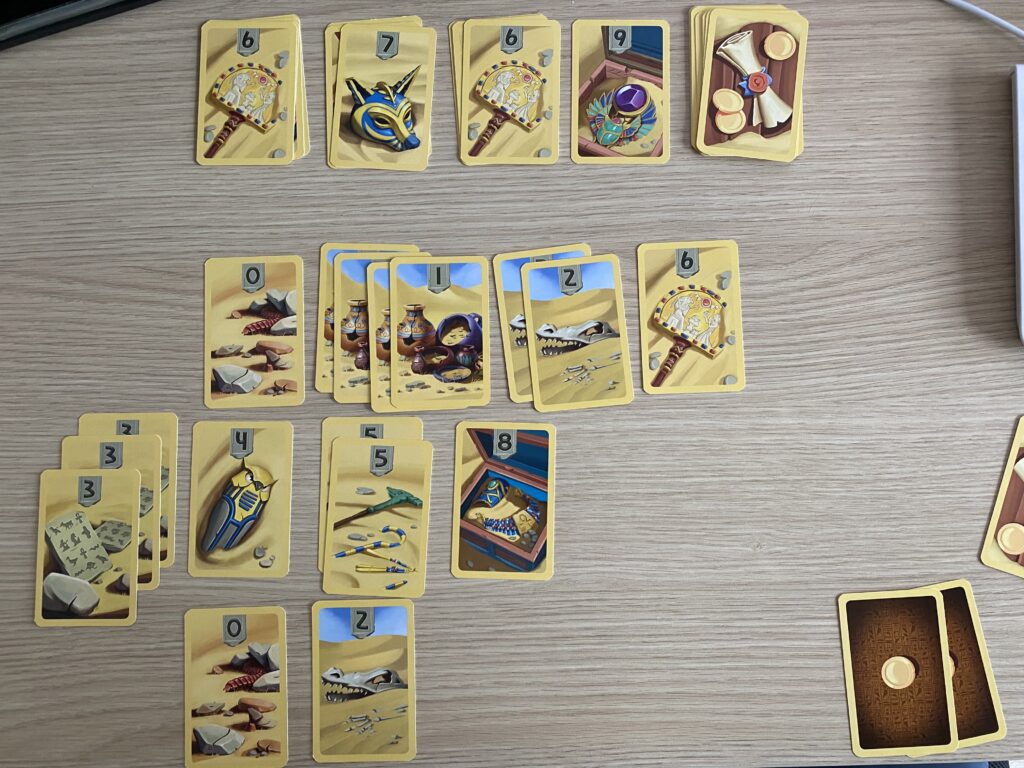The first board game or card game by author Florin Borluca takes us, according to the name of the game, to a cemetery and excavation site in Egypt near Cairo. A little card game that allows us to search for valuable finds in order to deliver the profitable collections to the local museum and receive rewards.
Bjorn Schwarzmüller
Game description
Initially, depending on the number of players, there are four to six sets of cards containing found objects. Discoveries are cards with values from 0 to 9 and are sorted in descending order, with 0 at the top.
The first three results with value 0 are taken from their piles and placed at the beginning of three rows of numbers at the bottom of the piles. All players in turn can now draw three cards from the piles and then the game can begin. When it's your turn, you have two options for action:
First choice It is to draw as many cards as you want from the piles, up to the hand limit of five.
the the second choice It is to place up to two cards from your hand in one or two of the three number rows. Digitally generated numbers must be generated in ascending order. Same values or gaps in numbers in rows are allowed. If you put equal values together, you will receive a bonus card worth 1 to 2 victory points at the end of the game. After placing the cards, the total value is checked, all numerical values are added together, and matching numbers are counted only once. If the value is 15 or higher, the entire row will be captured and you will receive one victory point per card at the end of the game. The lowest visible card of the deck is then placed as the starting point for the next empty row.
Cards can always be placed in front of or behind the starting card if it suits their value.
The game ends when all 24 bonus cards or all card combinations have been used. When determining victory points, each item found is worth one victory point. If I have more reward cards than found items, the rewards are worth 2 victory points each, otherwise you only get 1 victory point. Whoever has the most victory points wins Saqqara.
Author: Florin Borluca ■ Illustrations: Stefan Lorenz
Publisher: Beatnik ■ Publication year: 2023




2-4 players


From 8 years


About 15 minutes
Game rules (download attachment from Beatnik)


Gaming feeling
Saqqara It is a simple family card game that is explained and learned quickly.
The tactical depth is there because every move revolves around how to score points yourself without leaving too many good opportunities for other players afterwards. Because they are just waiting for other people's mistakes in order to benefit from them.
The flow of the game was not smooth because there was always something to manage or something to think about for a while. For a game that lasts about 15-20 minutes, this is overkill.
In the game itself, we do not feel at all like exploration managers, it is a completely abstract game and it would have been better to leave out its theme as it does not create any connection or depth in the game.




summary
Even though it's supposed to be a quick family game, it sometimes felt like it wanted to be a big brain teaser. It's not a quick card game because you're not very lucky, it's more like waiting for someone else to make a mistake that brings you the big points.
In the end, you're left with a feeling somewhere between worthlessness and boredom.






- beautiful drawings
- Small package
- A little something to think about


- There is no emotion
- The topic does not come up
- There is no luck, just waiting for others to make mistakes
- Get rid of the junk card


From my point of view as a player: If it is clear what number cards are in the game – if it is clear in what order they can be drawn – if it is clear which other players have which cards in their hand – it will become clear very quickly that this is not a game for those who play a lot. You can quickly calculate a match and then 15 minutes fly by and the next 15 minutes go with it. The game left me with the old feeling that there was a mathematical problem that was a bit more complicated, or if I just made it smaller, the winner would be completely random. In the end, I didn't care if I won or lost each game. In my opinion, there is no need to say or write anything more about the game.

“Explorer. Communicator. Music geek. Web buff. Social media nerd. Food fanatic.”







More Stories
A fossilized creature may explain a puzzling drawing on a rock wall.
MrBeast Sued Over ‘Unsafe Environment’ on Upcoming Amazon Reality Show | US TV
Watch comets Lemmon and SWAN approach Earth today